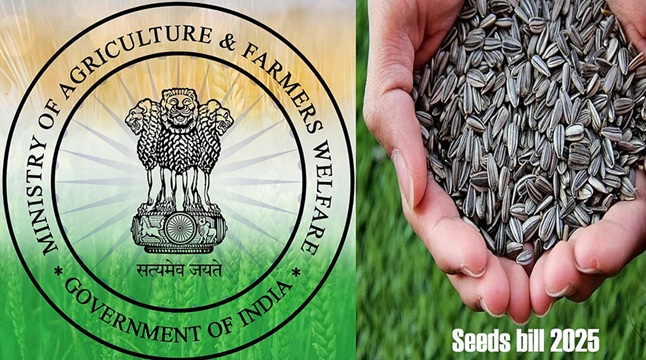Prelims: (Agriculture + Polity + Current Affairs)
Mains: (GS 2 – Governance; GS 3 – Agriculture, Food Security) |
Why in the News ?
The Union Ministry of Agriculture has published the Draft Seeds Bill 2025 and has sought public feedback until 11 December. The Bill seeks to update, consolidate, and modernise India’s seed laws by amending the Seeds Act, 1966 and the Seeds (Control) Order, 1983, aiming to ensure quality seeds for farmers while simplifying regulatory burdens on the seed industry.

What’s in Today’s Article?
Context and Rationale • Regulatory Architecture • Registration & Quality Control • Offences & Penalties • Farmers’ Rights • Concerns • FAQs
Background and Need for the Seeds Bill 2025
- India’s seed sector has evolved dramatically since the 1960s with advancements in biotechnology, hybrid seed technology, processing systems, and international seed trade.
- As per Agriculture Ministry data (2023–24):
- National seed requirement: 462.31 lakh quintals
- Available seeds: 508.60 lakh quintals
- Surplus: 46.29 lakh quintals
- Experts argue that the 1966 law is outdated, lacking provisions to manage modern genetic technologies, private sector participation, and global competitiveness.
- The need for a robust, transparent, and science-driven regulatory system has pushed the drafting of a new Bill.
Institutional Structure Proposed Under the Bill
Clarified Roles Across the Seed Value Chain
The Bill categorises participants into:
- Farmer
- Dealer
- Distributor
- Producer
This helps streamline regulatory responsibilities across production, distribution, and sale.
Central and State-Level Seed Committees
Two statutory bodies are planned:
- Central Seed Committee – 27 members Responsible for recommending standards relating to:
- Minimum germination
- Genetic & physical purity
- Trait performance and seed health
- Additional quality norms
- State Seed Committees – 15 members Will advise State governments on the registration of:
- Producers
- Dealers
- Nurseries
- Seed-processing units
Quality Control and Registration Mechanisms
Mandatory Registration of Processing Units
- All seed-processing units must secure registration from State authorities.
- Ensures traceability and quality assurance, though may raise compliance costs for smaller producers.
- A Centralised Accreditation Mechanism is being considered to ease processes for multi-State seed businesses.
National Seed Variety Register
- The Bill establishes a Registrar under the Central Seed Committee.
- Maintains a National Register of Seed Varieties.
- Standardises VCU (Value for Cultivation and Use) trials to ensure varieties are tested for performance and suitability.
Strengthening Seed Testing Infrastructure
- Central and State laboratories will be upgraded to assess:
- Germination
- Seed health
- Genetic purity
- These labs will support compliance verification for seed companies.
Enhanced Enforcement Powers
- Seed Inspectors will be empowered with search-and-seizure authority under the Bharatiya Nagarik Suraksha Sanhita, enabling stronger action against seed malpractice.
Offences and Penal Provisions
- The 2025 draft reworks the penalty structure when compared to the 2019 version.
- Offences are grouped into:
- Penalties escalate depending on severity to curb misbranding, substandard seed supply, and fraudulent practices.
- The new framework signals a tougher stance against seed quality violations.
Safeguards and Farmers’ Rights
- The Bill reaffirms farmers’ traditional rights to:
- Save
- Use
- Exchange
- Sell farm-saved seeds (except under a brand name)
- Aligns with the PPV&FR Act 2001, ensuring consistency between:
- Seed quality norms
- Plant variety protection
- Farmers’ entitlements
- Attempts to create a balanced system where innovation and farmers’ welfare coexist.
Concerns Flagged by Farmers’ Organisations
Several farmers’ unions—including the All India Kisan Sabha—have raised objections:
- Fear of price escalation and market domination by large seed companies.
- Concerns over seed sovereignty, as greater centralisation could disadvantage small producers.
- Worries that biodiversity safeguards may be weakened, potentially conflicting with:
- Convention on Biological Diversity (CBD)
- International Treaty on Plant Genetic Resources for Food & Agriculture
- Criticism that the Bill may create a corporate-heavy regulatory structure overshadowing the farmer-centric PPV&FR Act.
- They demand that the Bill must strengthen, not undermine, India’s biodiversity and farmers’ rights frameworks.
Significance
- Offers updated governance for a rapidly advancing seed sector.
- Attempts to balance innovation, quality, and farmer protection.
- Has major implications for agricultural productivity, food security, and private sector participation.
FAQs
1. What is the main objective of the Draft Seeds Bill 2025 ?
To modernise India’s seed regulatory system, ensure quality seeds for farmers, and update outdated provisions of the 1966 law.
2. Does the Bill restrict farmers from using their own seeds ?
No. Farmers may save, use, exchange, and sell farm-saved seeds, except under a brand name.
3. What is the National Seed Variety Register ?
A central database of all registered seed varieties, maintained by the Registrar under the Central Seed Committee.
4. Why are farmers’ groups opposing the Bill ?
They fear increased seed costs, corporate dominance, biodiversity risks, and weakening of farmer rights frameworks.
|



